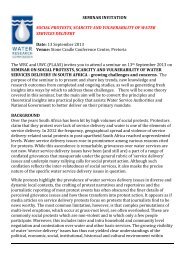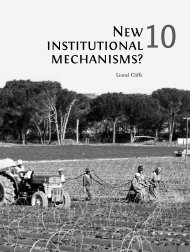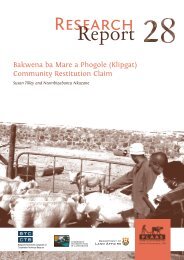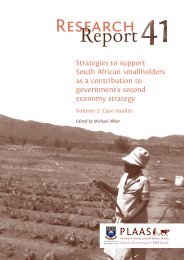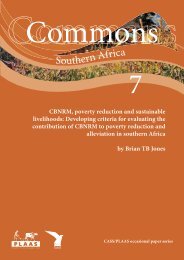A critical appraisal of South Africa's market-based land reform policy
A critical appraisal of South Africa's market-based land reform policy
A critical appraisal of South Africa's market-based land reform policy
Create successful ePaper yourself
Turn your PDF publications into a flip-book with our unique Google optimized e-Paper software.
Chapter 2: International <strong>land</strong> <strong>reform</strong> debates<br />
the flexible provision <strong>of</strong> loans and grants.<br />
Essential to the <strong>market</strong>-<strong>based</strong> approach is<br />
the liberalisation <strong>of</strong> the agricultural sector<br />
to remove distortions in various <strong>land</strong> and<br />
agriculture-related <strong>market</strong>s, especially<br />
those that favour or have been captured by<br />
large farmers and elites. Pro-<strong>market</strong><br />
economists argue that liberalisation will<br />
lead to a de-concentration <strong>of</strong> <strong>land</strong>holdings<br />
since distortions have favoured <strong>land</strong>holdings<br />
larger than the optimal size<br />
(Borras 2003:372; Binswanger & Deininger<br />
1996:68–9; World Bank 2003:<br />
155; Van Zyl et al. 1996; Williams 1996).<br />
Proponents <strong>of</strong> <strong>market</strong>-<strong>based</strong> <strong>land</strong> redistribution<br />
acknowledge that:<br />
(t)he <strong>land</strong> <strong>market</strong> cannot be<br />
expected to lead to an efficiencyenhancing<br />
redistribution <strong>of</strong> <strong>land</strong><br />
because poor family farmers who do<br />
not have much equity cannot acquire<br />
<strong>land</strong> even if they have access to<br />
mortgage credit (Binswanger &<br />
Deininger 1996:70).<br />
This is because <strong>market</strong> prices are, for a<br />
range <strong>of</strong> reasons, higher than the production<br />
value <strong>of</strong> <strong>land</strong>. 3 Therefore, the role<br />
<strong>of</strong> the state in facilitating <strong>land</strong> purchases at<br />
<strong>market</strong> prices is to provide a grant to subsidise<br />
the buyer: ‘such a grant element is<br />
required to provide the equity that the poor<br />
do not have’ (Binswanger & Deininger<br />
1996:71).<br />
Another key element <strong>of</strong> the <strong>market</strong><strong>based</strong><br />
approach is the self-selection <strong>of</strong><br />
beneficiaries who are best equipped to<br />
make good use <strong>of</strong> the <strong>land</strong>. Strategies to<br />
facilitate this self-selection are a demandled<br />
approach, which only responds to<br />
those who request <strong>land</strong>, and requires<br />
potential beneficiaries to work as a group.<br />
It is assumed that applicants in a group will<br />
know each other and therefore exclude<br />
those who they know are less likely to be<br />
effective members <strong>of</strong> the group (Borras<br />
2003:371). Requiring beneficiaries to<br />
contribute is suggested to ensure only<br />
those with commitment are involved, while<br />
also encouraging a sense <strong>of</strong> project<br />
ownership (Binswanger & Deininger<br />
1996:93).<br />
Decentralised delivery mechanisms –<br />
preferably with some form <strong>of</strong> local<br />
government involvement – strong roles<br />
for non-government and private sector<br />
service providers, and a community-<strong>based</strong><br />
approach are also recommendations<br />
common to the <strong>market</strong>-<strong>based</strong> approach<br />
(Bernstein 2002:447–8; Borras 2003:371).<br />
According to the World Bank (2003:156),<br />
‘the implementation <strong>of</strong> any <strong>land</strong> <strong>reform</strong><br />
programme should be decentralized, with<br />
potential beneficiaries and communities<br />
taking a lead’.<br />
The provision <strong>of</strong> grants to beneficiaries<br />
to buy privatised extension and support<br />
services for farm planning and production<br />
is seen as the route to cost-effective provision<br />
<strong>of</strong> the necessary expertise. However,<br />
government support for the development<br />
<strong>of</strong> technology and extension ‘at least in the<br />
initial stage’ is not ruled out (World Bank<br />
2003:156; Binswanger & Deininger 1996:<br />
93). It is assumed that the private sector<br />
will become more active in providing credit<br />
if beneficiaries become outright owners <strong>of</strong><br />
their <strong>land</strong> and once they have established<br />
themselves as successful commercial<br />
farmers (Borras 2003:372). For <strong>land</strong> to be<br />
used as collateral it is considered imperative<br />
that there be as few limitations as<br />
possible on sales and rentals <strong>of</strong> the <strong>land</strong> by<br />
the beneficiaries (Van Zyl et al. 1996:17;<br />
World Bank 2003:155).<br />
Financing <strong>of</strong> <strong>land</strong> redistribution is to be<br />
in the form <strong>of</strong> beneficiary contributions<br />
and government grants and loans.<br />
Economists argue that the provision <strong>of</strong><br />
grants rather than subsidies on loans and<br />
other inputs will have less <strong>of</strong> a distorting<br />
effect on the economy and be more easily<br />
managed and transparent (Borras 2003:<br />
373). The required funding is expected to<br />
come from a combination <strong>of</strong> government<br />
contribution from the fiscus (some <strong>of</strong> this<br />
available from savings made through the<br />
reduction or elimination <strong>of</strong> existing<br />
subsidies) and from international donors<br />
and aid agencies (Van den Brink et al.<br />
1996:449–51).<br />
There is general agreement that there is<br />
a need to target the poor, primarily through<br />
7




